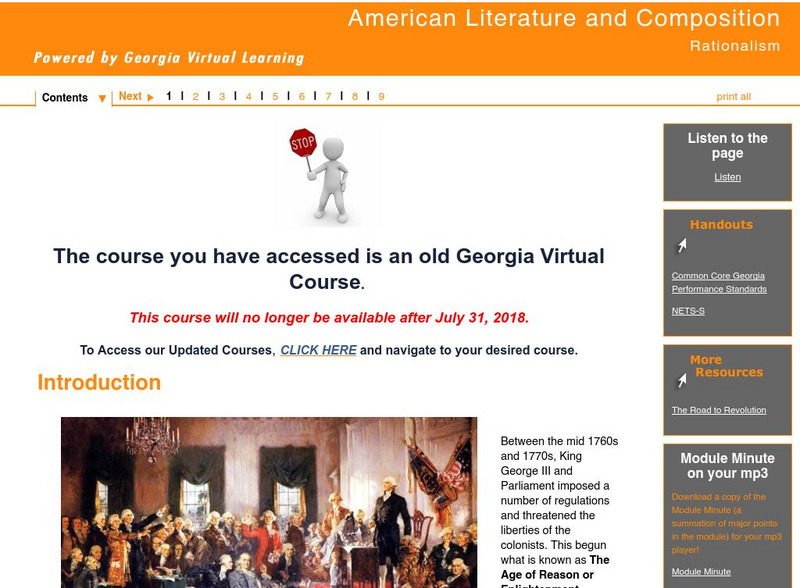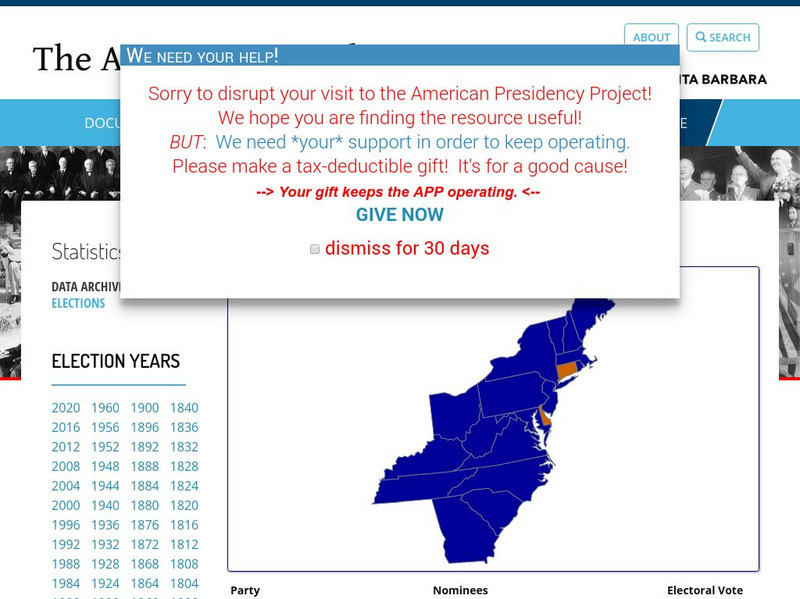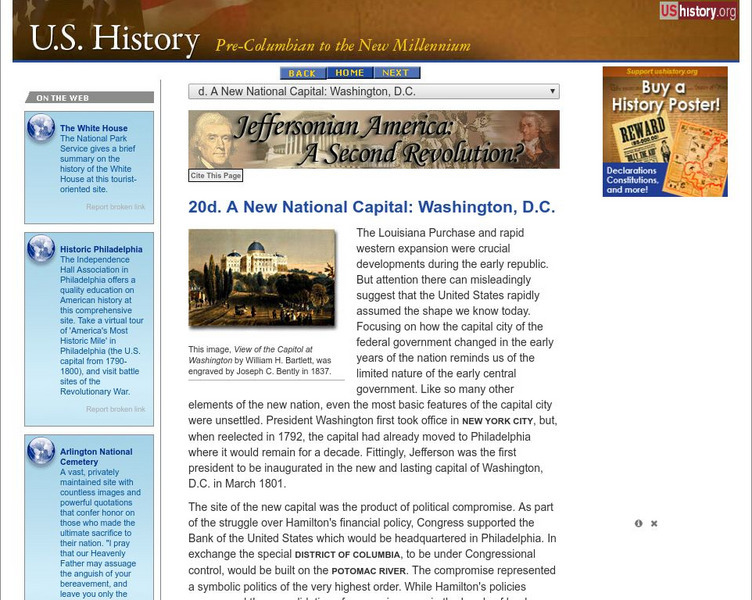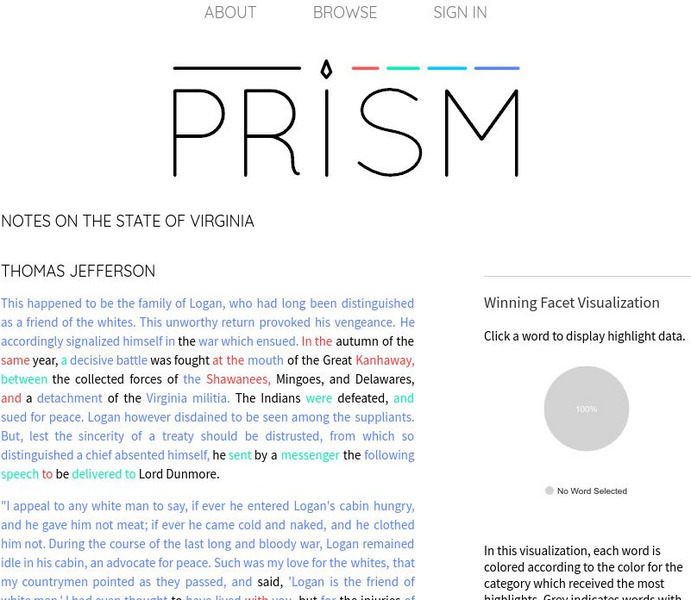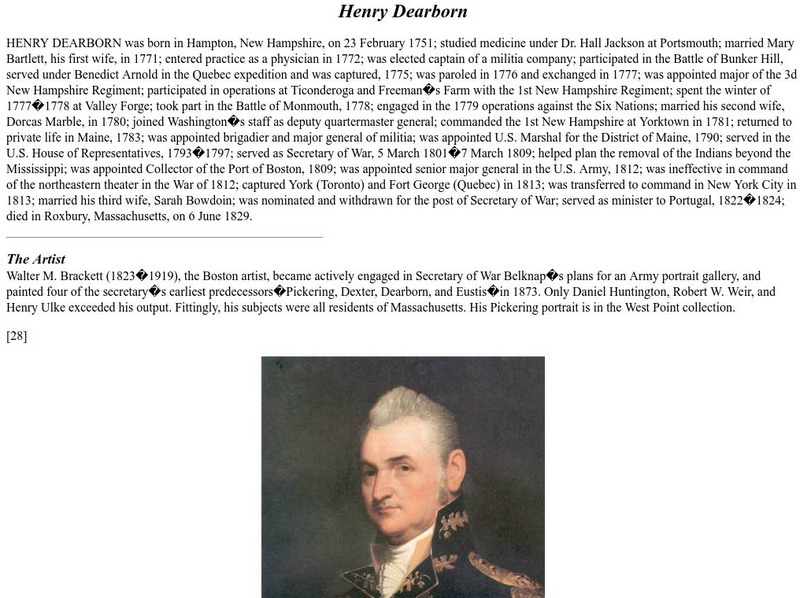Hi, what do you want to do?
Siteseen
Siteseen: American Historama: Aaron Burr Duel
Article provides information and interesting facts about Alexander Hamilton, first Secretary of the Treasury, who was shot dead by Vice President Aaron Burrin one of the most significant events of Thomas Jefferson's presidency.
US National Archives
National Archives: Lewis and Clark's Expedition to the Complex West
Jefferson sent Lewis and Clark to explore the land annexed in the Louisiana Purchase knowing that his area was already inhabited and politically complicated. Learners will explore documents related to the purchase and use the map to...
PBS
Pbs Liberty!: Independence! Philadelphia 1776
The newspaper layout makes it simple to read the accounts of the reaction to the signing of the Declaration of Independence. The article includes valuable links including an introduction to Thomas Paine and his role in this event.
PBS
Lewis and Clark: The Archives: Interviews: Dayton Duncan
This is a detailed account done in interview style about the Lewis and Clark expedition. Jefferson's role is discussed briefly in the second paragraph.
Huntington Library
Huntington Library: The Corps of Discovery: The Lewis and Clark Expedition [Pdf]
In this lesson, 5th graders learn about westward expansion and the Lewis and Clark expedition. Includes background information for the teacher. Students explore primary and secondary resource readings on the Louisiana Purchase, President...
Georgia Department of Education
Ga Virtual Learning: American Literature and Composition: Rationalism
This is an introduction to a unit on Rationalism, also known as The Age of Reason or Enlightenment, was set during the American Revolutionary period. It focuses on the belief that the power of reason and science would further human...
Curated OER
Web Gallery of Art: Bust of Thomas Jefferson
An image of "Bust of Thomas Jefferson", created by Jean-Antoine Houdon in 1789 (Marble, height 78 cm).
Library of Congress
Loc: America's Story: Library of Congress Bicentennial
The Library of Congress celebrates its bicentennial. This article looks at the Library's bicentennial birthday party, held inside and outside the Thomas Jefferson Building, celebrated the achievements of Americans everywhere.
Independence Hall Association
U.s. History: Westward Expansion: The Louisiana Purchase
Read about the fortuitous purchase made that doubled the size of the United States. See why Napoleon was willing to sell the land, and find out about the quandary Thomas Jefferson was in as he had to go against his strict construction...
Curated OER
Educational Technology Clearinghouse: Clip Art Etc: Jefferson Nickel
Contour line drawing the Jefferson nickel.
US National Archives
Our Documents: Declaration of Independence (1776)
The Our Documents group provides a look at the original, signed Declaration of Independence as well as a print version distributed soon after the original was signed. View and learn about the document and its history. RI.9-10.9 US Documents
Virginia History Series
Virginia History Series: Signers of the Declaration of Independence [Pdf]
Meet the seven men who signed the Declaration of Independence from Virginia. View pictures and read interesting biographical facts.
University of Virginia
University of Virginia: A View of the Rights of British America
Before writing the Declaration of Independence, Thomas Jefferson made his views known through "A Summary View of the Rights of British America" and other essays. This essay discusses the historical roots of independence and inalienable...
University of Maryland
Early Americas Digital Archive: Copy of a Letter From Benjamin Banneker
A letter from Benjamin Banneker to Thomas Jefferson on the injustice of slavers along with a reply from Jefferson back to Banneker.
American Presidency Project
American Presidency Project: Election of 1800
Online resource that provides detailed electoral data for the presidential election of 1800 won by Thomas Jefferson.
American Presidency Project
American Presidency Project: Election of 1804
Online resource that provides detailed electoral data for the presidential election of 1804 won by Thomas Jefferson.
University of Virginia
Muse and Confidante: The Muse and the Salon
This site contains a short biography on artist Maria Cosway. The site also contains her self-portrait, some of her paintings, and an original source document of a (unlegible) letter to Thomas Jefferson, whom she was rumored to have an...
Independence Hall Association
U.s. History: A New National Capital: Washington, d.c.
John Adams was the first president to reside in the President's House in the new capital Washington, D.C. Thomas Jefferson was the first president to be inaugurated there. Read about how this swampy area became the location of the...
University of Virginia Library
Prism: Notes on the State of Virginia
[Free Registration/Login Required] Read the complete text of Thomas Jefferson's "Notes on the State of Virginia" and highlight rhetoric in blue, orientalism in red, and social Darwinism in green. When finished, click save to see how...
270 To Win
270towin: 1804 Presidential Election
Provides detailed electoral facts for the presidential election of 1804 easily won by Thomas Jefferson in the first presidential election conducted following the ratification of the Twelfth Amendment to the United States Constitution.
270 To Win
270towin: 1800 Presidential Election
Provides detailed electoral facts for the presidential election of 1800 in a bitter battle won by Thomas Jefferson who defeated incumbent president John Adams.
Curated OER
The Jefferson Memorial
One-page website includes a brief paragraph on Thomas Jefferson, a chronology of his life and a paragraph on the Memorial.
Ibis Communications
Eyewitness to History: Writing the Declaration of Independence
An article about the Declaration of Independence which covers the selection of the Committee of Five, Jefferson's writing, the presentation to Congress for approval, the problems in drafting, and the final changes which were made....
US Army Center
U.s. Army Center of Military History: Henry Dearborn
Short biography of Henry Dearborn, Jefferson's first Secretary of War, from the 1992 version of the Secretaries of War and Secretaries of the Army book.
Other popular searches
- Jefferson, Thomas
- Thomas Jefferson Childhood
- President Thomas Jefferson
- Thomas Jefferson Picture
- Lesson Plans Thomas Jefferson
- Thomas Jefferson Presidency
- Who Was Thomas Jefferson
- Thomas Jefferson Activities
- Thomas Jefferson Memorial
- Thomas Jefferson Nickel
- Jefferson Thomas
- Thomas Jefferson Timeline





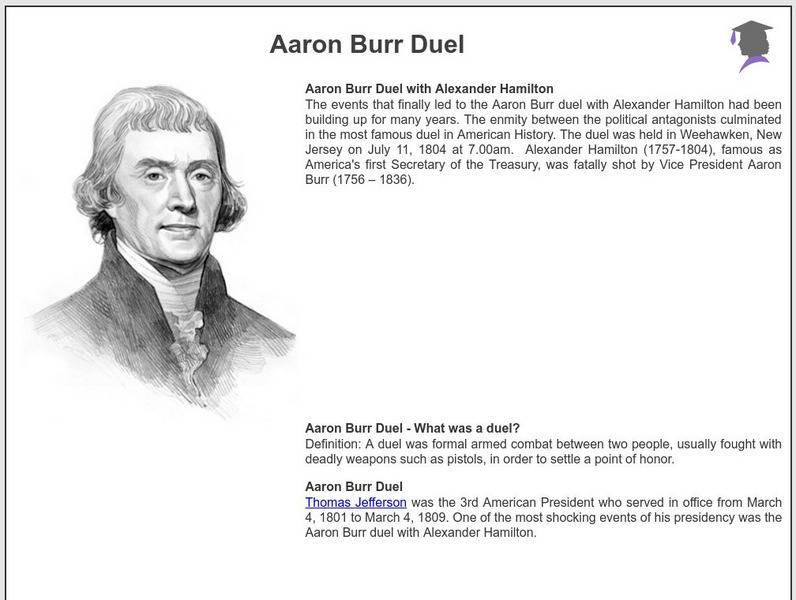


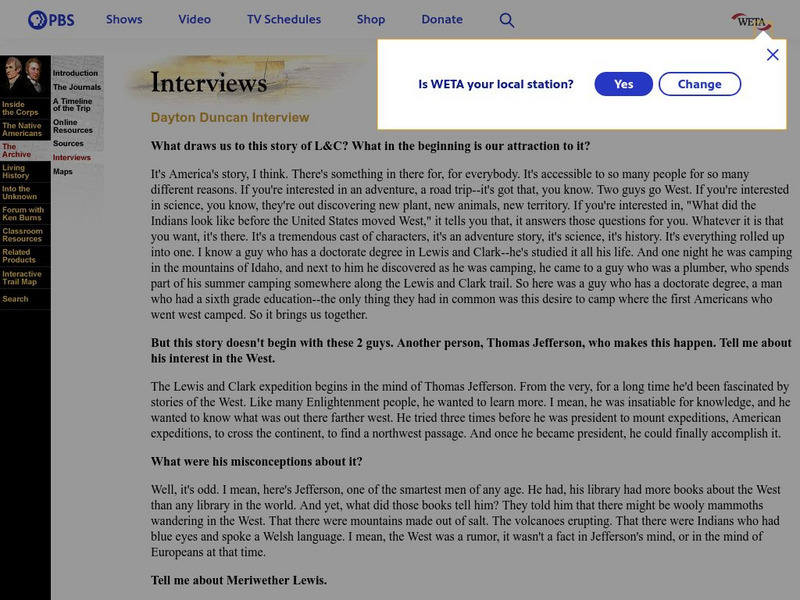
![Huntington Library: The Corps of Discovery: The Lewis and Clark Expedition [Pdf] Lesson Plan Huntington Library: The Corps of Discovery: The Lewis and Clark Expedition [Pdf] Lesson Plan](https://static.lp.lexp.cloud/images/attachment_defaults/resource/large/FPO-knovation.png)
